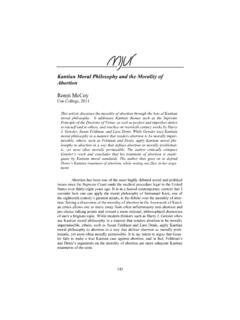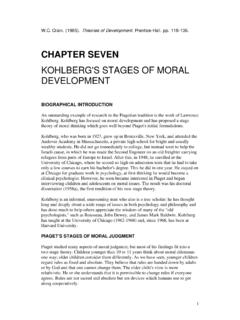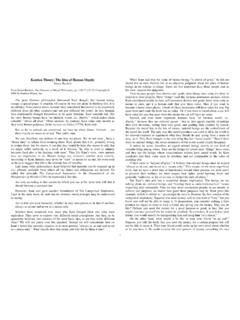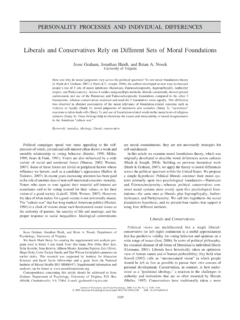Transcription of Socrates: Philosophy applied to Education - Search for Virtue
1 Athens Journal of Education - Volume 2, Issue 2 Pages 149-156. Socrates: Philosophy applied to Education - Search for Virtue By Gustavo Ara jo Batista . This text shows itself as one of the results of a theoretical or bibliographical research, whose purpose is to explain this finality of the Socratic thinking, that is: the applying of Philosophy into Education , as the most efficient way of breeding the individual for a personal and collective existence which be, overall, reflexive. The present article goes in Search of theoretical supporters, such as: Brun (1984), Cambi (1999), Dinucci (2009) and Plato (2004). Once upon the socratic Philosophy has been revealed itself a very fertile terrain to the spread of investigations of philosophical-educational order, this text also occupies itself of directing it to some considerations about the contribution of the socraticism to the educator's ethical-political auto-breeding, showing as its main result that the Socrates' personality and reflection constitute an immortal example of philosopher, educator and Virtue defender, whose dialogical method is still valued to the breeding of the contemporary educator.
2 Keywords: dialogue, Education , Philosophy , Socrates Virtue Introduction Socrates (471/470-399 ) is not only considered one of the main standards of philosophers; he is also one into the quality of one of the great educators of mankind; the truth of that affirmation is based on the fact according to which at least along the trajectory of western civilization, philosophers and educators from the most different eras and places sometimes invocate him such as one of their irrefutable icons. However, it is still necessary to demonstrate how Philosophy and Education combine each other inside socratic thought, in order to offer a theoretical board to think the praxis of educator's auto breeding, who must Search his or her own intellectual and moral excellence both such as a person either such as a professional, that is, he or she must look for Virtue , in order to be coherent with his or her ideals and actions.
3 Since Antiquity, Socrates was already known such as someone who, instead of having just taught Philosophy , he had lived it, according to the testimony that has come to us from Diogenes La rcio (2007). For this reason, Socrates is unavoidably conceived such as the standard, for excellence, of the practical philosopher, who is not satisfied with, as well as neither admits, unprofitable and inutile speculations, which contribute for nothing considering the intellectual and moral improvement of human being. Thus, his preoccupation with human practical problems, mostly the ethical ( moral ) and . Professor, University of Uberaba, Brazil. doi= Vol. 2, No. 2 Batista: Socrates: Philosophy applied to Education Search for Virtue politic (civic) ones, made of his reflection one of the main water divisors in the ambit of the history of Philosophy as well as in the ambit of the history of Education .
4 The reason for which here one defends Socrates as an innovator, both in Philosophy and in Education , it is based on his peculiar investigation method: " ", that is, refutation, which consists in a dialogue whose questions and answers concerning determined theme, at the end of that one should fatally make option for rejection of some thesis or affirmation, after being found its logic inconsistence or incoherence. This method, essentially dialogical, remains valid until today to philosophers and educators, who bet that, only starting from a dialogical perspective, one will be able to reach agreement, indispensable element to consolidation both to philosophical thought in general either to educational practice in particular, reason by which this text advocates the importance of knowledge about socratic thought as a philosophical fundament to educator's breeding. The Process of Creation of Socratic Philosophy and Pedagogy It is surely unknown when, how and why Socrates has become a philosopher; there are both anecdotes either serious affirmations regarding the reasons that would have driven him to make Philosophy his life work.
5 Moreover, it is very complicated to admit the historicity of his person, despite his unquestionable importance to the history of western philosophical and pedagogical thought; according to the testimony of Professor Jean Brun. Socrates' person puts to the philosopher a quite strange problem but full of sense: all the history of Greek Philosophy is traditionally organized around his name and we do not know who Socrates really was, there is no history of Greek thought but in function of Socrates' character and history does not allow us to make of him a historic character. (Brun, 1984, p. 9;. our English version). Howsoever, the fact is that, starting from him, the philosophical activity has been extended to the ambit of questions typically human, especially those ones of ethical-political order. Although Socrates has not left behind him anything written of his own fist, his thought has been passed centuries and has come to present days, both because of his followers, such as Plato1 (428/7- 1.)
6 Plato is, without shadow of doubt, the historic character who explored Socrates on the best way, both to describe him on his person and/or only to express his own thought, either to make of him the main issuing of his own ideas. His wide work, almost composed of dialogues, allows to affirm that: "There is not almost a platonic dialogue into which Socrates does not figure, in the most part he is who conducts the discussion and the interlocutors are always fully beated by his argumentation and irony. Works such as Apology of Socrates, Criton and Fedon can purport precious testimonies which allow us to fix more than a point of Socrates' biography" (Brun, 1984, p. 14; author's italicizes; our English version). 150. Athens Journal of Education May 2015. 348/7 ) and Xenophon1 (c. 430-355 ), either because of the mediation of his scoffers, whose the greatest example is the comedies writer Aristophanes2 (c.
7 447 385 ). Leaving aside the issue concerning the real or imagined existence of Socrates, which here is emphasized is the fact of thinking that is ascribed to him is one of the great watersheds, not only for Philosophy in Classical Antiquity, but for History of Philosophy in general and, particularly, have been constituted as a fertile and enduring theoretical foundation for Education . So, here we will not occupy whether, in fact, Socrates existed or not: what really is relevant to the purpose of this paper is to show in what measure all that Socrates represents becomes meaningful to do with that Philosophy and Education converge to the same purpose, namely: the reflexive or examined life, which is a process of introspection, after which the individual will be driven mostly by himself to the possession of Virtue . Thus, it appears that, in Socrates, Virtue is the principle on which parts the whole of his speculations, given that it is precisely assuming its existence, its knowledge and its practice that the Athenian thinker proposes to philosophize in order not to end somewhat different from the own Virtue .
8 Moreover, Virtue is also the ultimate end for which converge his thinking, which is why Philosophy is constituted, from his perspective, as the highest form of Education for Virtue . However, it should be noted that the Socratic Virtue is not confined to the limits of Homeric Virtue , from the heroic and aristocratic times, nor the boundaries of political Virtue , identified as the whole field of persuasion techniques, intensely widespread in his time. The concept of Virtue heralded by Socrates seeks to combine the Homeric nobility with sophistry dexterity, adding that the real nobility would be the result of a high character, intellectually and morally educated, in order to place the individual who holds it in a position to be beautiful and good, not only in view of his or her personal interests or advantages, but mainly the interests or benefits for the city-state, from which he or she is a citizen, and, likewise, the field of persuasion techniques would not have the required purpose only victory in any verbal event (priority of the Sophists), but rather convince the guy on the knowledge of truth and the practice of Virtue , since it would be his or her true happiness.
9 1. Jean Brun (1984, p. 16), relying on the testimony of Diogenes Laertius, relates how Xenophon and Socrates would have been found each other for the first time, when the first, across a narrow street of Athens, found the second, who would have done the following question to him: "Where do you buy the things needed for life?", before the response of Xenophon, Socrates undertook another question: "Where did you learn to be an honest man?" This time, because there was no response from Xenophon, Socrates, then, would have called him in these terms: "Come with me and I will teach thee.". 2. In one of his comedies, entitled The Clouds, Aristophanes depicts Socrates, as claimed by Jean Brun (1984, p. 20), so much ridiculed, caricaturing him as a lazy and bad tempered guy, a wicked and blasphemous sophist, devoted to investigate and make their followers investigate useless, futile and sterile problems, beyond being described as someone who abuses the ingenuity of his disciples.
10 151. Vol. 2, No. 2 Batista: Socrates: Philosophy applied to Education Search for Virtue Whichever here we add from Dinucci: For Socrates, happiness is gradually achieved through philosophizing. Thus, the relationship between Virtue and happiness, in Socrates, is an identity relation, then, by Virtue , man acts in a good and beautiful manner and therefore is happy, and no matter absolutely what matters has before him over which it exercises Virtue . The possession of Virtue is happiness for man, his absence, unhappiness. Everything else is relative to it; nothing added or removed with respect to happiness, which means to have moral Virtue (Dinucci, 2009, p. 262; our English version). Therefore, Socrates announces that nobility that he considers true is not one that comes from a divine lineage, in the same way that refuses to admit as virtuous someone who is merely skillful in persuading or dissuading; there is in his thought an intellectual and moral requirement much more intense, because, for him, Philosophy is to educate the individual, in a way that he or she may endeavor to be perfected gradually, resulting in it his or her nobility or Virtue .
















